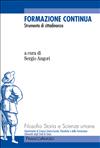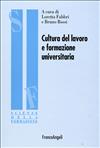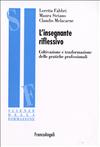
LIBRI DI CLAUDIO MELACARNE
La ricerca ha estratto dal catalogo 36 titoli


The article offers a critical review of the tools available to evaluate transformative learning process and outcomes. In the literature, there are different approaches to validate and use these tools, confirming that Transformative Learning Theory is a multi-layers theory. We would like to: 1) show the state of the art of assessment perspectives in TLT; 2) define a framework to categorize them; 3) depict a possible evolution of TL assessment approaches. Starting from this backdrop, in the second section of the article, we describe how and to what extent an on-line tool (Doctors’ Perspective Inventory) has been constructed and adapted to manage continuing educational activities for doctors in the framework of the transformative learning theory and professional development. The DPI is a quantitative, multi-language and self-respondent survey based on a Likert scale that is grounded on the TPI model (Teaching Perspective Inventory, Pratt, 1998). The thesis we will present is that the administration of this tool could support to plan organizational devices and transformative learning paths for professional development of community of practitioners within medical institutions




"Se i medici sapessero se i pazienti potessero" is an Action-Research project sponsored by the Department of Education, Humanities and Intercultural Communication at the University of Siena, started in March 2016. Built on the experience and the literature that identifies the group as a resource and place of peer learning, the goal of the project is to determine whether, and under which conditions, it is possible to establish a Community of Practice (CoP) that allows a social approach to the oncologic disease, emphasizing the exchange of knowledge between participants who are interested in experimenting this new approach to and management of the treatment


The projects of education and training with the methodology of "alternation between school and work" are possible for all students between 15° and 18° years of age, with the aim of making flexible the school training and connect the theoretical study of classroom with forms of learning activities in a professional context. It’s essential to connect a training alliance between teaching skills and the theme of the educational value of the work, as underlined by the guidelines issued to accompanying decrees, that set up the '"alternation". This, constantly, stress the importance that inside Curricula should take "the active teaching methods and the development of organic links with the world of work and the professions". So, that the workplace can be an important complement to the learning context of the classroom and the laboratory. Highlighting the importance of education and training of the work involves the fact that the school system no longer has a monopoly on the transmission of knowledge and co-exists with a variety of other educational agencies, especially businesses. We consider extremely important, in the light of these considerations, the formation of "teachers who organize activities in the "alternation" between school and work". The formation of this teaching specialist aims to outline a figure highly competent, in total support of the Headmaster and, possibly, as his collaborator chosen, as required by the text of the "Good School" in Italy.

The Job Placement Practices (JPP) can be described as the specific actions aimed at supporting students to enter their professional lives, bringing students and employers together, planning experiences, inside and outside university, where students can meet local stakeholders and learn the knowledge and the competences which are useful in the complex contemporary economical context. Each University translates such activities in situated practices and activities that could involve the overall student community, or single students during and after their university experience. Traineeship and stage activities are considered good practices to support the students enter their work life (Susan, Matthew, Rosanne, Taylor, Ellis, 2012). Together with other actions, these activities are seen as the most promising Job Placement Practices to favour the meeting between work professional needs and students’ skills (Billett, Harteis, Etelapelto, 2008). This article describes two practices useful to improve new strategies to manage and to plan traineeship activities in higher educational courses.

We present here the structure and some outcomes from the Sonna project (Social Network e Nuovi Apprendimenti). The project is designed to study the impact of on-line social media (S.M.) environment on learning processes of young and adult, in schools and professional environments. The research first phase is focused on the use of S.M. in everiday life and some promising models to understand their impact on learning. In the second phase field experimentation are conducted in schools and professional environments througout an on-line research platform designed and developed specifically for this research. The last part of the research will be focused on the analisys of qualitative and quantitative data to validate the hypotesys and models defined in the beghinning.

This paper is focused on the impact of the technologies in workplace. The research is inspired by the perspective of activity theory and show how the technological mediation has to be supported by immaterial elements to become an learning experience. The research is a case study focused on the innovation processes started in a Department of Education with the recent reform of Italian University. Underlining the relationship between action, tasks, tools and meanings, the reform could be described as an opportunity to support the learning organization and the artefacts used to improve this reform could be interpreted as ‘boundary object’.

The educational research experience presented in this article has been solicited by the Confartigianato Imprese Arezzo with the aim to support the professional development of their middle management, as a consequence of an imminent generational change within the same organisation. This experience has seen the participation of a training group made of 15 subjects (managers and middle managers). Such educational path has been planned within the framework of the Action Learning methodology. The present contribution is aimed at describing the adopted methodological process and presenting some findings in terms of subjects’ professional epistemological transformations and methodological approach issues.

Strumento di cittadinanza
Interrogandosi sugli aspetti problematici delle pratiche professionali e degli scambi relazionali propri della vita lavorativa/organizzativa, la formazione continua promuove apprendimenti e sensibilità che travalicano i confini dell’ambito lavorativo e incidono sulla promozione culturale e sociale delle persone, concorrendo così a rendere effettivamente fruibili, anche da parte dei soggetti con bassa scolarità, i diritti di cittadinanza.
cod. 871.25


Presupposti teorici e congegni metodologici in grado di promuovere e diffondere una cultura del lavoro all’interno dell’università e di sostenere, con specifiche azioni di supporto, gli studenti nel difficile passaggio dall’università al mondo del lavoro.
cod. 292.2.101

Coltivazione e trasformazione delle pratiche professionali
Nell’ultimo trentennio nel panorama internazionale della ricerca e della pratica educativa ha avuto luogo una significativa svolta epistemologica, con l’affermarsi di un approccio “riflessivo”. Gli insegnanti si propongono come agenti riflessivi, in grado di realizzare e utilizzare in prima persona nuove forme di conoscenza. Ciò richiede che le istituzioni, le organizzazioni, i sistemi sociali, assegnino e riconoscano agli insegnanti competenze costruttive e ricostruttive di saperi e conoscenze prodotti attraverso percorsi di riflessione.
cod. 292.2.95